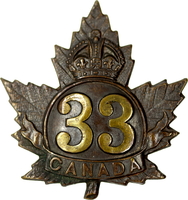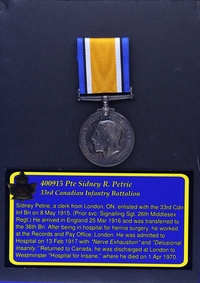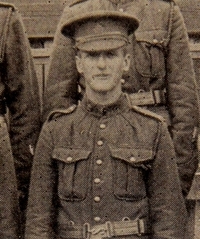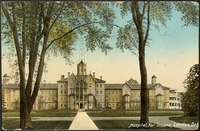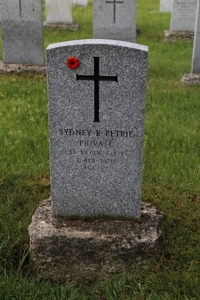
400915 Private Sidney R. Petrie
26th Middlesex Regiment
33rd Canadian Infantry Battalion
By: Capt (ret'd) Michael M. O'Leary, CD, The RCR
Sidney R. Petrie was the fourth of seven sons of William Mills Petrie and Jessie Clara (nee Pope). Born on 7 Dec 1893 at London, Ontario, Petrie was a Sergeant in the 26th Middlesex Regiment at the time of his attestation for overseas service in the Canadian Expeditionary Force. Enlisting on 8 May 1915, Petrie claimed four years of prior service with the 26th Regiment.
A clerk by trade, Sidney Petrie was described in his attestation form as 5 feet 8 inches tall, with a 34 1/2-inch chest, fair complexion, grey eyes and blonde hair. He was medically examined and pronounced fit for overseas service on 18 May 1915. Petrie identified his mother, Mrs. Jessie Clara Petrie, as his next of kin. Her address at that time was 52 Argyle St., London, Ontario.
Having been the Signaling Sergeant of the 26th Regiment, Petrie found himself in similar employment with the 33rd Battalion, C.E.F. A published volume of photos of the 33rd Battalion shows him in the unit's Signaling Section. The 33rd Battalion sailed for England on 17 Mar 1916. He arrived in England on 25 March.
Petrie was admitted to Moore Barracks Hospital, Shornecliffe on 10 Apr 1916 with a diagnosed hernia, for which an operation was performed 15 Apr 1916. He was transferred to the Canadian Convalescent Hospital at Woodcote Park, Epsom, on 24 May 1916 and discharged from there on 6 Jul 1916 and transferred to the 36th Battalion.
Continuing to serve in England, Petrie returned to hospital on 14 Feb 1917 when he was admitted to the Ontario Military Hospital at Orpington, Kent, for "Nervous Exhaustion." A month later he was back at Moore Barracks Hospital with an NYD annotation (i.e., "not yet determined/diagnosed"). One month further on, he was admitted to No. 11 Canadian General Hospital and confirmed as suffering from "Dementia." Re-admitted at Orpington on 12 Mar 1917, Petrie's service record notes a diagnosis of "Delusional Insanity." A medical Transfer Certificate completed at Moore Barracks Hospital notes that Petrie was "Dull, depressed, delusional; impulsive, at times breaks windows."
A Medical Case Sheet completed at Shornecliffe included the comment that Petrie had stated "that shortly after his arrival in England he saw a newspaper report that his Mother was reported missing and later heard that she had been found in the "Bush" during a blizzard suffering from religious mania, and taken to a Hospital for Insane. This so worried him that he could not settle down to his work."
Petrie's present condition at that time was described as: "During ordinary conversation this patient apparently is in normal condition, but in other respects he is suffering from delusional insanity. He has told the patients in the ward "that everybody thinks he is the Messiah" "that he did not enter the hospital for nervous exhaustion but that he had syphilis" "that at one time he thought a great deal of religion, but since his operation, power has left his body and gone to his head and now he sees religion is no good." He has been showing suicidal tendencies, having been found one day in the Medicine Closet in the act of taking some tablets marked "Poison" from a bottle. A razor was also found by the Night Sister under his pillow."
Sidney Petrie sailed for Canada from Liverpool aboard the S.S. Letitia on 11 April 1918. The card recorded his departure includes a single word as reason for his return: "Insane." Arriving at Halifax, Nova Scotia, on 20 April, Petrie address on discharge was already determined to be the "Hospital for Insane, London, Ont." His diagnosis was recorded as "Catatonic Dementia, Praecox." (Wikipedia provides the following definition for this condition: Dementia praecox (a "premature dementia" or "precocious madness") is a disused psychiatric diagnosis that originally designated a chronic, deteriorating psychotic disorder characterized by rapid cognitive disintegration, usually beginning in the late teens or early adulthood.)
At the time of Petrie's return to Canada, his next of kin was still identified as his mother, Mrs J.C. Petrie. Her address recorded was "care of Hosp. For Insane, London, Ontario." His file notes that the supposed causes of his condition were "Hereditary mental instability worry over the fact that his mother was placed in Hosp. For Insane, London, Ont., and having Gonorrhea in Nov 1916." The same document notes that Petrie's father was deported from Canada as an undesirable.
Back in Canada, Petrie was examined by a board of three medical officers at Quebec on 23 Apr 1917. The report they completed described Petrie's condition as follows:
"Patient sits with eyes closed and will not answer any questions. He occasionally mumbles something about having syphilis and wanting treatment.
"He is thin and pale, eyelids firmly closed, pupils equal, patellar reflexes absent, hart and lungs normal.
"There are no documents with this soldier but he is undoubtedly insane and should be sent to an asylum.
"Degree of Incapacity: Total.
"Probably duration of incapacity:- impossible to say.
"Does it render him unfit for Military Service?: Yes."
Petrie was sent to District Depot No. 1 at London, Ontario, for discharge as medically unfit for further military service. Discharged on 17 Aug 1918, at the age of 25 Petrie became a permanent resident of the Hospital for Insane. His Discharge Certificate notes that his character and conduct during his service was "Very Good."
For his service in England, Sidney Petrie was entitled to receive the British War Medal. This was sent to him care of the Westminster Hospital, London, Ontario, in January 1923.
Sidney Petrie died on 1 Apr 1970. He was still residing at Westminster Hospital at the time of his death. Petrie is buried in Woodland Cemetery, London, Ontario.
Pro Patria
Visit a randomly selected page in The O'Leary Collection (or reload for another choice):
- The O'Leary Collection; Medals of The Royal Canadian Regiment.
- Researching Canadian Soldiers of the First World War
- Researching The Royal Canadian Regiment
- The RCR in the First World War
- Badges of The RCR
- The Senior Subaltern
- The Minute Book (blog)
- Rogue Papers
- Tactical Primers
- The Regimental Library
- Battle Honours
- Perpetuation of the CEF
- A Miscellany
- Quotes
- The Frontenac Times
- Site Map
QUICK LINKS
The O'Leary Collection—Medals of The Royal Canadian Regiment
Newest additions:
![]()
![]() SB-12725 Private Henry "Hank" Ard
SB-12725 Private Henry "Hank" Ard ![]()
WIA at Hill 187, Died of Wounds in Japan
![]()
![]() 2355331 Lance Corporal Albert Lorking
2355331 Lance Corporal Albert Lorking
Wounded in action, later a War Amps representative.
![]()
![]() 4334 / 477996 Pte Isaac Hamilton Wilcox
4334 / 477996 Pte Isaac Hamilton Wilcox
Permanent Force, South Africa, and C.E.F.
![]()
![]() 477019 Private Harold Ashcroft
477019 Private Harold Ashcroft
Transferred to the Tunnelers.
![]()
![]() 734231 Private Clark D. Thompson
734231 Private Clark D. Thompson ![]()
The older Thompson brother, killed in action.
![]()
![]() 733849 Private Norman Parker Thompson
733849 Private Norman Parker Thompson
The younger Thompson brother; post-war service in the Special Guard.
![]()
![]()
![]() A305 / 400305 Private Andrew Walker
A305 / 400305 Private Andrew Walker ![]()
"Previously reported Wounded, now Killed in Action."
![]()
![]() 823298 Pte Thomas Patrick Steele, M.M.
823298 Pte Thomas Patrick Steele, M.M. ![]()
… for gallant conduct in the field …
![]()
![]() P13066 Sergeant Harold Thompson
P13066 Sergeant Harold Thompson
Instrumental Soloist for over 20 years of Canadian Army service.
![]()
![]() 9609 / 477728 Private Albert Edward Piper
9609 / 477728 Private Albert Edward Piper
"Arrived from England as a STOWAWAY …"
